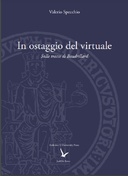Explore

During an era in which the main form of recognition would seem to be entrusted to the screen, Jean
Baudrillard’s reflections offer extremely useful interpretative tools to understand the neo-existence
of the screened individual. According to the French philosopher, the simulation, as a codification of
entities in a data flow, can be interpreted as a informatic potlatch, a ritual shortcircuit, fueled by the
consumption of bits as the ultimate guarantee of persistence. This practice would envelop the entire
society in a claustrophobic suspension, smoothing out any possibility of contact, bringing out the
user as a transmission channel of an empty signifier: the digital code. The surface of the screen,
exposing a sort of ontological indigestion between the individual and his digital projection, would
find its own matrix in the intersection between the metaphysical problem and the political question
through the figure of the hostage. The screen-society, from the shining call to entertainment, would
turn upside down in a saving form of disappearance, reconfiguring a world in which the antiquated
shadows of reality would have sharpened into ghosts that had become more real than reality,
hyperreal. Precisely starting from this fissure, from this mingling of virtuality and reality, that seems to emerge the urgency of a thought that, as Baudrillard wanted, can transmit the resistance of an elusive singularity.
This book is included in DOAB.
Why read this book? Have your say.
You must be logged in to comment.
Rights Information
Are you the author or publisher of this work? If so, you can claim it as yours by registering as an Unglue.it rights holder.Downloads
This work has been downloaded 48 times via unglue.it ebook links.
- 48 - pdf (CC BY-NC-ND) at Unglue.it.
Keywords
- digital code
- Humanities
- hyper-reality
- Philosophy
- potlatch
- screen
- simulation
- thema EDItEUR::Q Philosophy and Religion::QD Philosophy
Links
DOI: 10.6093/978-88-6887-168-0Editions

